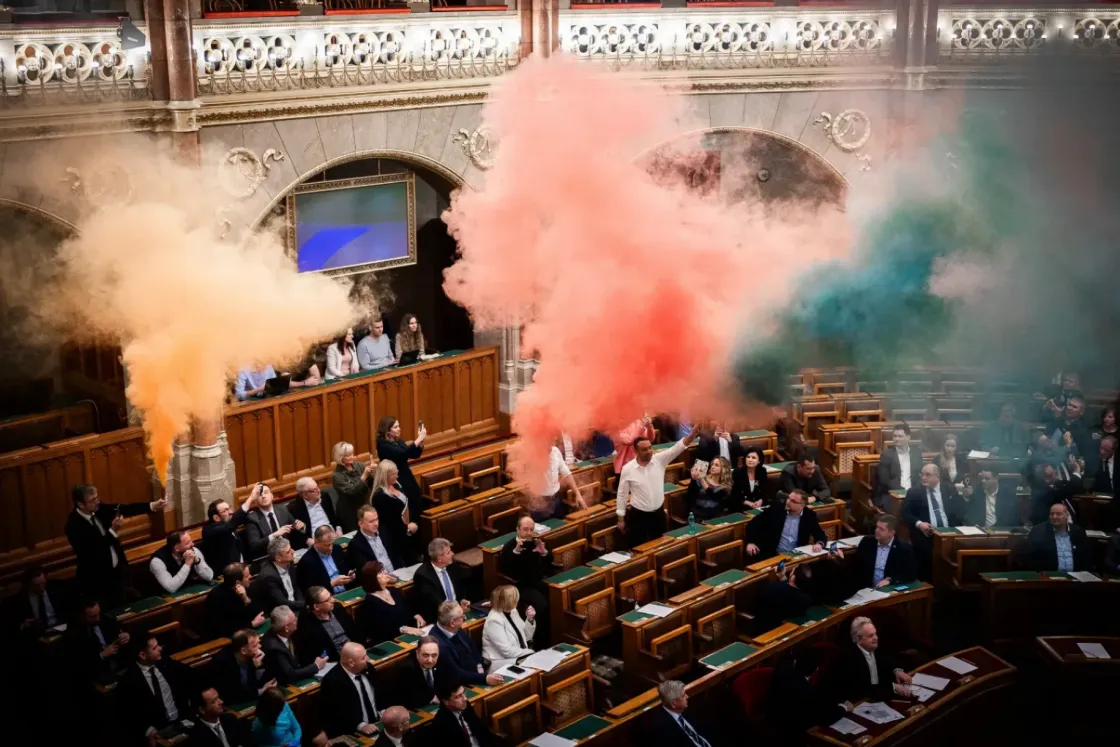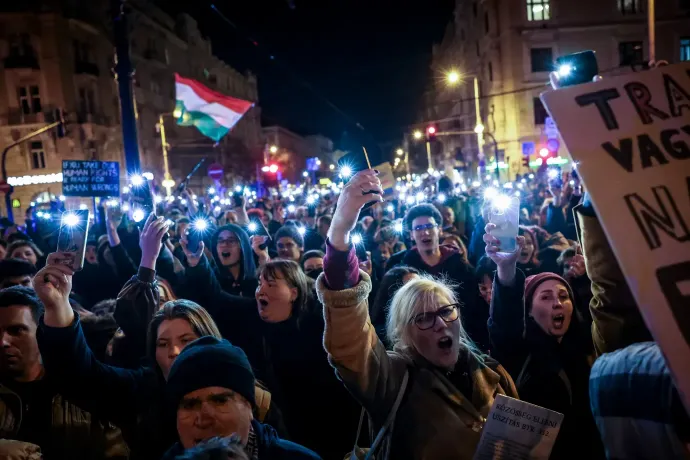
On the grounds of protecting children, Hungary's governing Fidesz-KDNP coalition is restricting the right of assembly. On Tuesday afternoon Parliament voted in favour of a bill to ban Pride. In the future, it will be forbidden in Hungary to hold rallies promoting homosexuality, and both the organisers and the participants of such an event could be fined up to 200,000 forints (EUR 500).
The proposal was adopted by 136 votes in favour, 27 against and no abstentions. In addition to Fidesz-KDNP, Jobbik and Mi Hazánk MPs also supported the amendment.
The MPs of Momentum and Ákos Hadházy (independent) lit smoke candles, played the Soviet anthem and scattered photos of Orbán and Putin kissing all over the Parliament prior to the vote.
"We won't allow it!" – the opposition MPs shouted. KDNP's János Latorcai, who chaired the session, called on everyone to remain calm. "Those who were born to create disorder are doing just that right now", he said. In his opinion, despite the scandal, "the majority did their job with honour, decency and discipline", and added that the Momentum MPs should expect sanctions.

Máté Kocsis, the leader of Fidesz’s parliamentary group, commented on the events on his Facebook page, writing that: "the little foreign-funded Bolsheviks of our time" were at work in parliament.
Pushed through parliament in one day
The bill was tabled by six government MPs on Monday morning, and was pushed through parliament in one day, under a special procedure. Fidesz was in such a hurry to get the amendment adopted, that Parliament firts passed the Assembly Act before the amendment to the Fundamental Law, which states that the right to "protection and care necessary for the proper physical, mental and moral development" of children supersedes long-standing constitutional rights such as the freedom of assembly and expression.
Under the newly adopted amendment,
it will be prohibited to hold a gathering that “promotes or displays any deviation from a person's gender at birth, as well as gender reassignment and homosexuality.”
Under the amendment, police will also be allowed to use facial recognition software to identify participants of such a gathering. According to a 444 article, the legal conditions for this were created in a 2015 law, which Fidesz at the time justified on the grounds of international criminal cooperation, the fight against terrorism and the rise in document fraud. Even at that time, it was suggested that the law could be used to monitor people at demonstrations, but the ruling party swept this concern off the table with a thinly veiled criticism of Ferenc Gyurcsány (He was the Hungarian PM between 2004-2009. Although they have been in power non-stop since 2010, to this day, the Fidesz government is keen to respond to any criticism by putting the blame on him.)
As well as the organisers, participants will also be breaking the law and will have to pay a fine, the minimum being 6500 forints (EUR 16) and the maximum 200,000 forints (EUR 500). The proposal does not make any distinction between the organisers and the participants. According to the amendment, it is a violation of the law both to organise such a meeting and to "participate in it despite having been expressly informed by the police at the meeting venue of the prohibited nature of the same". The authors have also stipulated that the fines imposed cannot be exchanged for community service or imprisonment for the offence, and that the funds collected must be used for child protection.
Fundamental rights may be infringed
According to the Hungarian Helsinki Committee, the amendment violates several fundamental rights, in particular the prohibition of discrimination, the right to freedom of assembly and the right to the protection of personal data.
András Kádár, co-chair of the Hungarian Helsinki Committee, told our paper that there is no scientific evidence or sociological data to suggest that the mention of being gay or the public discussion of the position of sexual minorities in society has a negative impact on children. In fact, he said, it is explicitly not in the best interest of children if they do not have access to relevant and appropriate information about sexuality and non-heterosexual sexual orientations.
At the last government briefing, when we asked Minister of the Prime Minister's Office, Gergely Gulyás to do so, he was unable to provide any research or evidence in support of the claim that the Pride Parade would hinder children's healthy physical and psychological development. Gulyás said that "common sense" justifies taking action against Pride, because "people with families do not usually go near Pride, but avoid even that part of the city on the day of the event". Experience, however, shows that this is not true.

"This is a very weighty amendment to the law, the specific purpose of which is to ban Pride," Szabolcs Hegyi, a lawyer at the Hungarian Civil Liberties Union (TASZ), told Telex. According to him, fundamental human rights are not given to people by the government, but by virtue of them being human, so the legislator cannot take them away.
“One may like or dislike Pride, but this amendment is clearly intended to discourage people from standing up for the equal rights of their fellow citizens.”
András Kádár also said that the amendment not only infringes on individuals' rights to the protection of their personal data – when it comes to those who wish to participate in Pride – but also on the rights of anyone whose image is captured by the police during an operation and is then identified based on that image. Previously, this was only possible in cases involving the most serious offences (and therefore punishable by imprisonment), but the amendment would remove this restriction and allow it for any offence.
"Although the example might seem extreme, but from now on, if someone were to drop a handkerchief, say at a 15 March commemoration, and this is caught on camera by the police securing the event, it will be possible to identify the person by facial image analysis and prosecute them for the breach of public order." According to András Kádár,
this is obviously a disproportionate restriction of the right to the protection of personal data and is not only contrary to the Hungarian Fundamental Law, but also to the Charter of Fundamental Rights of the European Union.
Pride organisers: this is not child protection, it is fascism
Prime Minister Viktor Orbán originally announced in his annual State of the Nation address in February that it would soon be included in the Fundamental Law that a human is either a man or a woman. "In fact, I advise the organisers of Pride not to bother preparing for this year's parade. It would be a waste of money and time," the Prime Minister said at the time, much to the delight of the Fidesz audience.
Budapest Mayor Gergely Karácsony said on Facebook on Monday that Budapest “will protect all those who had and have the courage to stand up for their self-worth, to stand up for their community, to stand up for freedom, for the power of love. We will have Pride!”
“At this point this is not child protection, it is fascism. Pride is a movement that cannot be banned”
– Máté Hegedűs, the spokesperson and organiser of Budapest Pride, said in response to Telex's request for comment.
Hegedűs said that they will certainly proceed with organising this year's parade, and that the 30th Budapest Pride will in some form take place on 28 June. They are looking at the available alternative options to organising Pride as a demonstration under the law on assembly. “We find it unacceptable that in an EU member state LGBTQ people are not allowed to express what they think about the government.”
"What is this if not another step towards the Russian system and dictatorship? This is exactly why everyone should now go to Pride and show that we cannot be intimidated!" – László Sebián-Petrovszki, a member of parliament from DK, and a member of the parliament's Justice Committee wrote on his social media page, while Gábor Kubatov, deputy chairman of Fidesz, said that Pride is nothing but a provocation and that there is no place for gender propaganda in Hungary.
“A day of mourning in Hungary’s history”
Within a few hours of the amendment’s adoption, thousands responded to the call of the opposition party Momentum by gathering on Kossuth tér to protest the decision.
Speaking about the parliament's decision, the first speaker at the demonstration, the vice-chair of Momentum, Lajos Lőcsei said: "Fidesz are treasonous, pro-Putin deniers of rights and tramplers of law. They are scumbags and nobodies who have disregarded what our parents built".

"This is a day of mourning in Hungary's history", said the Momentum MP, and he called it regrettable that there are satellite parties, "the nobodies who claim to be in opposition", but who watched what was done in parliament without any qualms.
"If we are not allowed to assemble freely, what will be next? This is truly just a step away from curbing the freedom of speech and the further deprivation of rights (...) This is such a strong step towards Putin's Russia that we simply cannot allow it" – Dávid Bedő, the parliamentary group leader of Momentum said to those assembled at the square on Tuesday afternoon.
"Our freedom is being taken away in small steps, day by day", Bedő said, adding that for the past 15 years there has been a stifling, oppressive feeling in the country, and that based on what Orbán said, he expects the system to get even more brutal in the next year. The fact that in 24 hours, parliament has managed to ram through a law that deprives citizens of their most basic rights is a prime example of this.
Momentum's group leader promised that they will be there every time any group is attacked by the powers that be, or any group is deprived of their rights. He said it is time to declare that Hungary is not a hybrid regime, but fascism.
“Fascism is still fascism even when they are not locking us up in camps, but behind four walls.”
"How can one ban love?" – Bedő asked, and promised that Momentum would be there at Pride on 28 June and that they would set up a fund to help anyone who is fined.
In his speech at the demonstration, independent MP Ákos Hadházy said:
“What happened today was not just another step forward (...) It was a huge leap from the remains of democracy to dictatorship.”
According to him, the task is simple: everyone must stand up for themselves and we must restore democracy. He believes that the point of Fidesz's amendment is to make it harder to exert real pressure to enforce genuine elections, and this must be prevented. Peaceful, but firm pressure is needed if we are to achieve a result, he said.
A swift signing
Commissioner for Human Rights of the Council of Europe, Michael O'Flaherty, reacted to the passing of the amendment banning Pride in Hungary in a post on X, and said he was very concerned.
"I call on the President of Hungary to veto the law", he wrote in a public post addressed to President Tamás Sulyok.
In spite of this, the law banning Pride was published in the Hungarian Official Gazette the very next day, meaning that President Sulyok signed it almost immediately, and the legislation thus came into force immediately after its adoption by parliament on Tuesday.
"There will be a Pride Parade!" – Budapest Mayor Gergely Karácsony wrote on Facebook shortly after Fidesz first submitted the amendment banning Pride.
In a previous post last Friday, the mayor of the capital said that they were preparing for the 30th Budapest Pride in spite of the government's plan to ban the event. He said that
"the fact that there is going to be a Budapest Pride this year is as self-evident as the love between two people, as obvious as the fact that no one, no one in this city should be at a disadvantage because of what they believe in, where they were born and who they love".
Karácsony also wrote that "no matter what anyone says, in Budapest, this free city proud of its diversity, this June there will be a celebration of joy, a celebration of love, a celebration of freedom, in other words: Budapest Pride. It may even be bigger than ever before", the mayor said, concluding his post.
For more quick, accurate and impartial news from and about Hungary, subscribe to the Telex English newsletter!